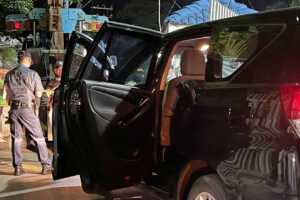Ghosts

It is not Charles Dickens’ Ghost of Christmas Past that has been haunting the so-called justice system. It is the specter of atrocities past and present for which many condemn it as unworthy of the name.
Those “adverse events” include the extrajudicial killings (EJKs), kidnappings, drug trading and other high crimes some police officers have been involved in, but for which they have not been made accountable; the issuance by certain judges of warrants of arrest against independent journalists, political and social activists, and government critics without a whit of evidence for which they have not been disciplined; and the mysterious deaths of high-profile inmates that occur even in the jails that are crammed to the rafters with prisoners in this high-crime country.
All have convinced many that the pursuit of justice is as futile as the hope that the mass of the electorate of these troubled isles will ever elect the leaders that will bring it out of the Stone Age and into the 21st century.
Only last June 25 at the tail-end of the Duterte regime, eight high-profile New Bilibid Prison (NBP) inmates convicted of drug and murder charges were killed by 22 policemen right in the NBP premises. And arguably the most outrageous killing of an inmate was that of Albuera, Leyte Mayor Rolando Espinosa in November 2016 in one of the Bureau of Jail Management and Penology’s (BJMP) provincial jails supposedly because he engaged policemen who were serving him a search warrant in a fire fight.
That story was as full of holes as chicken wire. From where and how did Espinosa get a firearm? And why were the police serving him a search warrant while he was in jail? The attempted answers to those questions were as incredible as any ghost story and have since passed into the dark recesses of State impunity.
And lest we forget, there are the hundreds of prisoners of conscience — political prisoners such as former Senator Leila de Lima — who have been languishing in various detention facilities for years while their trials on fabricated charges proceed glacially, thus underscoring the truth of the adage that justice delayed is justice denied.
There is also the case of some judges’ issuing warrants of arrest left and right without any regard for the evidence or the welfare of their victims, even as the Philippine National Police (PNP) is still under scrutiny for the thousands, among them minors, its operatives killed extrajudicially during the “drug war” and after. Assured by former President Rodrigo Duterte that no matter what they do they would never see the inside of any prison, the perpetrators have either been transferred to other jurisdictions, only charged administratively, or not prosecuted at all.
One of the latest citizens to be convinced that there is something profoundly wrong with the justice system is the brother of slain journalist Percy Lapid who is understandably both outraged and fearful for his and his family’s safety.
Roy Mabasa demanded accountability of the Bureau of Corrections (BuCor) and the resignation of its officials for the suspicious circumstances surrounding the death of one of the “middlemen” in its custody who supposedly contracted and paid the killer of Percy Lapid and his accomplices in behalf of the mastermind behind it. BuCor officials had denied that he was among NBP prisoners. But they then announced that he had died in the NBP hospital on Oct. 18, and claimed that he was using another name, hence their response to PNP inquiries that he was not in Bilibid. Depending on who is speaking to the media, he either died in his cell or in the NBP hospital where he was brought after complaining of shortness of breath.
As incredibly difficult to accept as that tale is, was it merely a coincidence that the middleman died on Oct. 18, the very same date when the surrender of the supposedly “conscience-stricken” gunman to the PNP on Oct. 17 was revealed to the media?
No one can blame Mr. Mabasa for doubting the truth of the convoluted story that is unfolding about his brother’s murder on Oct. 3. He thus went as far as to suggest during an interview with ABS-CBN that getting justice has become impossible in these isles of impunity. In addition to the distinct possibility that the mastermind in the killing of his brother may never be known and prosecuted, what angers him as well is the continuing danger to his family posed by that still scot-free mastermind’s assumed capacity to do them and anyone else harm.
Public reactions echoed his view. Many citizens implied or outrightly declared that while the intent of the various agencies of the justice system seems to be to show that government is determined to get the mastermind(s) in the Lapid murder, what is going on is the usual scripted play that will end in no one’s, except quite possibly the supposed gunman’s, being prosecuted and imprisoned.
One suspects that the same view of the justice system is shared by millions of Filipinos whose own experience or that of their friends, neighbors and kin validate their skeptical reaction to such assurances as that those guilty of this or that crime will be found and punished without fear or favor. The wealthy, powerful, and well-connected who have been convicted of such crimes as plunder are after all even in government, while those accused of the pettiest crimes are immediately hauled off to jail where many have been in detention without having been tried and convicted.
Every study on what issues are most important to the citizens of this country has established their concern for justice as crucial to their lives and therefore their regard for government. They may not state the need for it in so many words, but justice, they correctly assume, is the foundation of civilized society and is at least as important as education, medical care, and having a roof over one’s head and food on the table. It has even been argued that the hankering for justice has tipped the balance in favor of fundamental changes — even revolutions — in government, politics and society during periods of crisis.
The killing of journalists and media workers in the Philippines — 197 so far since 1986 — has underscored the imperative of putting an end to them not only to reverse the country’s reputation as among the most dangerous places in the world to be a journalist. It is even more important in providing the conditions in which press freedom and free expression may flourish as rights indispensable to the resumption of the democratization and development process that past regimes such as the Marcos Sr. dictatorship and the Duterte despotism hindered and undermined.
The Percy Lapid case is both a challenge to, and an opportunity for, the stewards of the justice system to demonstrate in deeds the truth of their claims that all the system components — the police, the courts and the prisons — are working. Otherwise the ghosts of Kian delos Santos and the thousands of presumably innocent victims of extrajudicial killings in the “drug war;” the shameful use of judicial power against those who dare exercise their right to free expression; the persecution, intimidation and harassment of journalists by State agencies; and the killings that occur even in the country’s jails will continue to haunt the justice system as undeniable indicators of its failure to function as it should by prosecuting and punishing the guilty and protecting and exonerating the innocent.
Luis V. Teodoro is on Facebook and Twitter (@luisteodoro).




